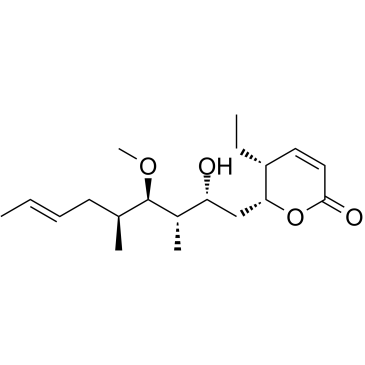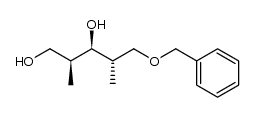| Description |
Pironetin is an α/β unsaturated lactone isolated from Streptomyces species. Pironetin binds to α-tubulin and is a potent inhibitor of microtubule polymerization, and has cell cycle arrest and antitumor activity[1][2].
|
| Related Catalog |
|
| Target |
Microtubule[1]
|
| In Vitro |
Pironetin (20-100 ng/mL; 24 hours; 3Y1 cells) treatment arrests the cell cycle progression at G2/M in 3Y1 cells[1]. Pironetin (1-10000 ng/mL; 3 days; HeLa, A2780 and K-NRK cells) treatment inhibits the cell proliferation. IC50 values against these cell lines are almost 10 ng/mL[1]. Cell Cycle Analysis[1] Cell Line: 3Y1 cells Concentration: 20 ng/mL, 50 ng/mL, 100 ng/mL Incubation Time: 24 hours Result: Arrested the cell cycle progression at G2/M in3Y1 cells. Cell Proliferation Assay[1] Cell Line: HeLa, A2780 and K-NRK cells Concentration: 1 ng/mL, 10 ng/mL, 100 ng/mL, 1000 ng/mL and 10000 ng/mL Incubation Time: 3 days Result: Inhibited the cell proliferation.
|
| In Vivo |
Pironetin (0.78-6.25 mg/kg; intraperitoneal injection; daily; for 5 days; female CDF1-SLC mice) treatment shows a moderate antitumor effect, however, a severe weight loss is observed as a side effect[1]. Animal Model: Female CDF1-SLC mice (10 weeks) injected with P388 murine leukemia cells[1] Dosage: 0.78 mg/kg, 1.56 mg/kg, 3.13 mg/kg, 6.25 mg/kg Administration: Intraperitoneal injection; daily; for 5 days Result: Showed a moderate antitumor effect.
|
| References |
[1]. Kondoh M, et al. Cell cycle arrest and antitumor activity of pironetin and its derivatives. Cancer Lett. 1998 Apr 10;126(1):29-32. [2]. Yang J, et al. Pironetin reacts covalently with cysteine-316 of α-tubulin to destabilize microtubule. ] Nat Commun. 2016 Jun 30;7:12103.
|

![(5R,6R,2'R,3'R,4'R,5'S)-(7'E)-9'-5-Ethyl-5,6-dihydro-6-[4'-methoxy-2'-[(methoxymethyl)oxy]-3',5'-dimethyl-7'-nonenyl]-2H-pyran-2-one Structure](https://image.chemsrc.com/caspic/317/172603-27-9.png) CAS#:172603-27-9
CAS#:172603-27-9 CAS#:108393-28-8
CAS#:108393-28-8![(2R,3S,4R)-1-(Benzyloxy)-5-[(tert-butyldiphenylsilyl)oxy]-2,4-dimethyl-3-pentanol Structure](https://image.chemsrc.com/caspic/381/172722-41-7.png) CAS#:172722-41-7
CAS#:172722-41-7![(2R,3S,4R)-1-(Benzyloxy)-5-[(tert-butyldiphenylsilyl)oxy]-3-methoxy-2,4-dimethylpentane Structure](https://image.chemsrc.com/caspic/252/172603-11-1.png) CAS#:172603-11-1
CAS#:172603-11-1 CAS#:332842-68-9
CAS#:332842-68-9